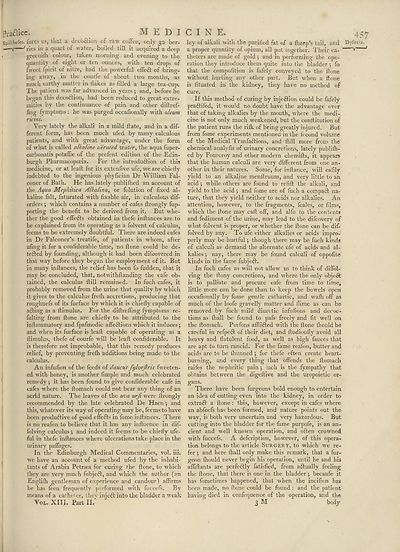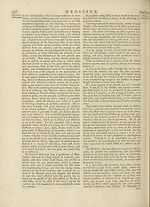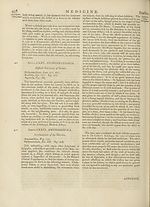Encyclopaedia Britannica, or, a Dictionary of arts, sciences, and miscellaneous literature : enlarged and improved. Illustrated with nearly six hundred engravings > Volume 13, MAT-MIC
(499) Page 457
Download files
Complete book:
Individual page:
Thumbnail gallery: Grid view | List view

practice. M E D I
Epifehefes. fares us, that a decoction of raw coffee, only 30 ber-
-»■ v ' ries in a quart of water, boiled till it acquired a deep
greenifh colour, taken morning and evening to the
quantity of eight or ten ounces, with ten drops of
fweet fpirit of nitre, had the powerful effeft of bring¬
ing away, in the courfe of about two months, as
much earthy matter in flakes as filled a large tea-cup.
The patient was far advanced in years •, and, before he
began this deco61ion, had been reduced to great extre¬
mities by the continuance of pain and other diftref-
fing fymptoms: he was purged occafionally with oleum
ricini.
Very lately the alkali in a mild ft ate, and in a dif¬
ferent form, has been much ufed by many calculous
patients, and with great advantage, under the form
of what is called alkaline aerated water, the aqua fuper-
carbonatis potaffm of the prefent edition of the Edin¬
burgh Pharmacopoeia. For the introduction of this
medicine, or at leaft for its extenfive ufe, we are chiefly
indebted to the ingenious phyfieian Dr William Fal¬
coner of Bath. He has lately publiflied an account of
the Aqua Mephitica /llkalina, or folution of fixed al¬
kaline fait, faturated with fixable air, in calculous dif-
orders 5 which contains a number of cafes ftrongly fup-
porting the benefit to be derived from it. But whe¬
ther the good effeCts obtained in thefe inftances are to
be explained from its operating as a folvent of calculus,
feems to be extremely doubtful. There are indeed cafes
in Dr Falconer’s treatife, of patients in whom, after
ufing it for a confiderable time, no ftone could be de¬
tected by founding, although it had been difeovered in
that way before they began the employment of it. But
in many inftances, the relief has been fo fudden, that it
may be concluded, that, notwithftanding the eafe ob¬
tained, the calculus ftill remained. In fuch cafes, it
probably removed from the urine that quality bv which
it gives to the calculus frefli accretions, producing that
roughnefs of its furface by which it is chiefly capable of
aCting as a ftimulus. For the diftrefling fymptoms re-
fulting from ftone are chiefly to be attributed to the
inflammatory and fpafmodic affeftions which it induces j
and when its furface is leaft capable of operating as a
ftimulus, thefe of courfe will be leaft confiderable. It
is therefore not improbable, that this remedy produces
relief, by preventing frefh additions being made to the
calculus.
An infufion of the feeds of daucus fylveffris fweeten-
ed with honey, is another fimple and much celebrated
remedy; it has been found to give confiderable eafe in
cafes where the ftomach could not bear any thing of an
acrid nature. The leaves of the uva urji were ftrongly
recommended by the late celebrated De Haen 5 and
this, whatever its way of operating may be, feems to have
been produdlive of good effedls in fome inftances. There
is no reafon to believe that it has any influence in dif-
folving calculus *, and indeed it feems to be chiefly ufe-
ful in thefe inftances where ulcerations take place in the
urinary paffages.
In the Edinburgh Medical Commentaries, vol. iii.
we have an account of a method ufed by the inhabi¬
tants of Arabia Petraea for curing the ftone, to which
they are very much fubjedl, and which the author (an
Englifh gentleman of experience and candour") affirms
he has feen frequently performed with fuccefs. By
means of a catheter, they injedt into the bladder a tveak
Vol. XIII. Part II.'
CINE.
ley of alkali with the purified fat of a fheep’s tail, and D)
a proper quantity of opium, all put together. Their ca-
theters are made of gold and in performing the ope¬
ration they introduce them quite into the bladder ; fo
that the compofition is fafely conveyed to the ftone
without hurting any other part. But when a ftone
is fituated in the kidney, they have no method of
cure.
If this method of curing by injedtion could be fafely
pradlifed, it would no doubt have the advantage over
that of taking alkalies by the mouth, where the medi¬
cine is not only much weakened, but the conllitution of
the patient runs the rilk of being greatly injured. But
from fome experiments mentioned in the fccond volume
of the Medical Tranfadlions, and ftill more from the
chemical analyfis of urinary concretions, lately publifli¬
ed by Fourcroy and other modern chemifts, it appears
that the human calculi are very different from one an¬
other in their natures. Some, for inftance, will eafily
yield to an alkaline menftruum, and very little to an
acid ; wffiile others are found to refift the alkali, and
yield to the acid •, and fome are of fuch a compadl na¬
ture, that they yield neither to acids nor alkalies. An
attention, however, to the fragments, feales, or films,
which the ftone may call off, and alfo to the contents
and fediment of the urine, may lead to the difeovery of
what folvent is proper, or whether the ftone can be dif-
folved by any. To ufe either alkalies or acids impro¬
perly may be hurtful •, though there may be fuch kinds
of calculi as demand the alternate ufe of acids and al¬
kalies 5 nay, there may be found calculi of oppofite
kinds in the fame fubjedl.
In fuch cafes as will not allow us to think of diffol-
ving the ftony concretions, and where the only obje&
is to palliate and procure eafe from time to time,
little more can be done than to keep the bowels open
occafionally by fome gentle cathartic, and wafti off as
much of the loofe gravelly matter and flime as can be
removed by fuch mild diuretic infufions and decoc¬
tions as ffiall be found to pafs freely and fit well on
the ftomach. Perfons afflidled with the ftone fhould be
careful in refpedl of their diet, and ftudioufly avoid all
heavy and flatulent food, as well as high fauces that
are apt to turn rancid. For the fame reafon, butter and
acids are to be fhunned ; for thefe often create heart¬
burning, and every thing that offends the ftomach
raifes the nephritic pain •, uch is the fympathy that
obtains between the digeftive and the uropoietic or¬
gans.
There have been furgeons bold enough to entertain
an idea of cutting even into the kidney, in order to
extraft a ftone : this, however, except in cafes where
an abfeefs has been formed, and nature points out the
way, is both very uncertain and very hazardous. But
cutting into the bladder for the fame purpofe, is an an¬
cient and well known operation, and often crowned
with fuccefs. A defeription, however, of this opera¬
tion belongs to the article SURGERY, to which we re¬
fer ; and here fhall only make this remark, that a fur-
geon fhould never begin his operation, until he and his
affiftants are perfedtly fatisfied, from adlually feeling
the ftone, that there is one in the bladder •, becaufe it
has fometimes happened, that when the incifion has
been made, no ftone could be found : and the patient
having died in confequence of the operation, and the
3 M body
Epifehefes. fares us, that a decoction of raw coffee, only 30 ber-
-»■ v ' ries in a quart of water, boiled till it acquired a deep
greenifh colour, taken morning and evening to the
quantity of eight or ten ounces, with ten drops of
fweet fpirit of nitre, had the powerful effeft of bring¬
ing away, in the courfe of about two months, as
much earthy matter in flakes as filled a large tea-cup.
The patient was far advanced in years •, and, before he
began this deco61ion, had been reduced to great extre¬
mities by the continuance of pain and other diftref-
fing fymptoms: he was purged occafionally with oleum
ricini.
Very lately the alkali in a mild ft ate, and in a dif¬
ferent form, has been much ufed by many calculous
patients, and with great advantage, under the form
of what is called alkaline aerated water, the aqua fuper-
carbonatis potaffm of the prefent edition of the Edin¬
burgh Pharmacopoeia. For the introduction of this
medicine, or at leaft for its extenfive ufe, we are chiefly
indebted to the ingenious phyfieian Dr William Fal¬
coner of Bath. He has lately publiflied an account of
the Aqua Mephitica /llkalina, or folution of fixed al¬
kaline fait, faturated with fixable air, in calculous dif-
orders 5 which contains a number of cafes ftrongly fup-
porting the benefit to be derived from it. But whe¬
ther the good effeCts obtained in thefe inftances are to
be explained from its operating as a folvent of calculus,
feems to be extremely doubtful. There are indeed cafes
in Dr Falconer’s treatife, of patients in whom, after
ufing it for a confiderable time, no ftone could be de¬
tected by founding, although it had been difeovered in
that way before they began the employment of it. But
in many inftances, the relief has been fo fudden, that it
may be concluded, that, notwithftanding the eafe ob¬
tained, the calculus ftill remained. In fuch cafes, it
probably removed from the urine that quality bv which
it gives to the calculus frefli accretions, producing that
roughnefs of its furface by which it is chiefly capable of
aCting as a ftimulus. For the diftrefling fymptoms re-
fulting from ftone are chiefly to be attributed to the
inflammatory and fpafmodic affeftions which it induces j
and when its furface is leaft capable of operating as a
ftimulus, thefe of courfe will be leaft confiderable. It
is therefore not improbable, that this remedy produces
relief, by preventing frefh additions being made to the
calculus.
An infufion of the feeds of daucus fylveffris fweeten-
ed with honey, is another fimple and much celebrated
remedy; it has been found to give confiderable eafe in
cafes where the ftomach could not bear any thing of an
acrid nature. The leaves of the uva urji were ftrongly
recommended by the late celebrated De Haen 5 and
this, whatever its way of operating may be, feems to have
been produdlive of good effedls in fome inftances. There
is no reafon to believe that it has any influence in dif-
folving calculus *, and indeed it feems to be chiefly ufe-
ful in thefe inftances where ulcerations take place in the
urinary paffages.
In the Edinburgh Medical Commentaries, vol. iii.
we have an account of a method ufed by the inhabi¬
tants of Arabia Petraea for curing the ftone, to which
they are very much fubjedl, and which the author (an
Englifh gentleman of experience and candour") affirms
he has feen frequently performed with fuccefs. By
means of a catheter, they injedt into the bladder a tveak
Vol. XIII. Part II.'
CINE.
ley of alkali with the purified fat of a fheep’s tail, and D)
a proper quantity of opium, all put together. Their ca-
theters are made of gold and in performing the ope¬
ration they introduce them quite into the bladder ; fo
that the compofition is fafely conveyed to the ftone
without hurting any other part. But when a ftone
is fituated in the kidney, they have no method of
cure.
If this method of curing by injedtion could be fafely
pradlifed, it would no doubt have the advantage over
that of taking alkalies by the mouth, where the medi¬
cine is not only much weakened, but the conllitution of
the patient runs the rilk of being greatly injured. But
from fome experiments mentioned in the fccond volume
of the Medical Tranfadlions, and ftill more from the
chemical analyfis of urinary concretions, lately publifli¬
ed by Fourcroy and other modern chemifts, it appears
that the human calculi are very different from one an¬
other in their natures. Some, for inftance, will eafily
yield to an alkaline menftruum, and very little to an
acid ; wffiile others are found to refift the alkali, and
yield to the acid •, and fome are of fuch a compadl na¬
ture, that they yield neither to acids nor alkalies. An
attention, however, to the fragments, feales, or films,
which the ftone may call off, and alfo to the contents
and fediment of the urine, may lead to the difeovery of
what folvent is proper, or whether the ftone can be dif-
folved by any. To ufe either alkalies or acids impro¬
perly may be hurtful •, though there may be fuch kinds
of calculi as demand the alternate ufe of acids and al¬
kalies 5 nay, there may be found calculi of oppofite
kinds in the fame fubjedl.
In fuch cafes as will not allow us to think of diffol-
ving the ftony concretions, and where the only obje&
is to palliate and procure eafe from time to time,
little more can be done than to keep the bowels open
occafionally by fome gentle cathartic, and wafti off as
much of the loofe gravelly matter and flime as can be
removed by fuch mild diuretic infufions and decoc¬
tions as ffiall be found to pafs freely and fit well on
the ftomach. Perfons afflidled with the ftone fhould be
careful in refpedl of their diet, and ftudioufly avoid all
heavy and flatulent food, as well as high fauces that
are apt to turn rancid. For the fame reafon, butter and
acids are to be fhunned ; for thefe often create heart¬
burning, and every thing that offends the ftomach
raifes the nephritic pain •, uch is the fympathy that
obtains between the digeftive and the uropoietic or¬
gans.
There have been furgeons bold enough to entertain
an idea of cutting even into the kidney, in order to
extraft a ftone : this, however, except in cafes where
an abfeefs has been formed, and nature points out the
way, is both very uncertain and very hazardous. But
cutting into the bladder for the fame purpofe, is an an¬
cient and well known operation, and often crowned
with fuccefs. A defeription, however, of this opera¬
tion belongs to the article SURGERY, to which we re¬
fer ; and here fhall only make this remark, that a fur-
geon fhould never begin his operation, until he and his
affiftants are perfedtly fatisfied, from adlually feeling
the ftone, that there is one in the bladder •, becaufe it
has fometimes happened, that when the incifion has
been made, no ftone could be found : and the patient
having died in confequence of the operation, and the
3 M body
Set display mode to:
![]() Universal Viewer |
Universal Viewer | ![]() Mirador |
Large image | Transcription
Mirador |
Large image | Transcription
Images and transcriptions on this page, including medium image downloads, may be used under the Creative Commons Attribution 4.0 International Licence unless otherwise stated. ![]()
| Permanent URL | https://digital.nls.uk/192667649 |
|---|
| Attribution and copyright: |
|
|---|
| Description | Ten editions of 'Encyclopaedia Britannica', issued from 1768-1903, in 231 volumes. Originally issued in 100 weekly parts (3 volumes) between 1768 and 1771 by publishers: Colin Macfarquhar and Andrew Bell (Edinburgh); editor: William Smellie: engraver: Andrew Bell. Expanded editions in the 19th century featured more volumes and contributions from leading experts in their fields. Managed and published in Edinburgh up to the 9th edition (25 volumes, from 1875-1889); the 10th edition (1902-1903) re-issued the 9th edition, with 11 supplementary volumes. |
|---|---|
| Additional NLS resources: |
|

